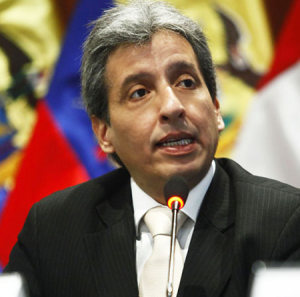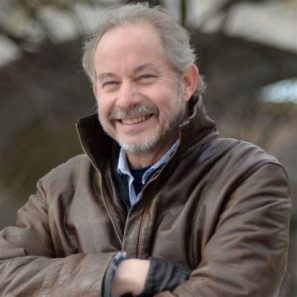
Forest Trends’ CEO Michael Jenkins sat down last week (virtually, at least) with Manuel Pulgar-Vidal, leader of WWF’s Climate and Energy Practice, for a wide-ranging conversation about the effects COVID-19 is having on climate negotiations, recovery planning, and leadership in turbulent times.
Michael Jenkins:
Thank you Manuel for sitting down to talk. For our readers, Manuel Pulgar-Vidal is the former Minister of Environment for Peru. Manuel was the President of the COP in the lead-up to the Paris Agreement, and I think it’s fair to say Manuel was one of the leading architects of the Paris Climate Agreement. He has been a long-time environmental lawyer and was part of the group that started the Peruvian Environmental Law Society (SPDA). And of course he is part of Forest Trends’ Board of Directors.
Manuel, we’ve just heard formally that the COP in Glasgow is postponed until 2021, I’d like to talk about the expectations that we had leading into Glasgow. What were we hoping to achieve by November of this year in Scotland?

Manuel Pulgar-Vidal:
Since the Paris agreement was signed in 2016, 2020 has been a key year. It’s the year we enter a new phase for countries’ climate plans, which are called Nationally Determined Contributions, or NDCs.
In 2020 countries are supposed to update their NDCs. We know that the first round of NDCs that countries put on the table back in 2014 and 2015 were not strong enough. At the time, the Secretariat of the UNFCCC published a report aggregating the outcomes of the NDCs, that showed that even if we fully carried out these plans, we’d see global temperatures by the end of the century rise by 2.7 degrees Celsius. We know that would be catastrophic. We can’t raise temperatures by more than 1.5 degrees in reality. That’s why the new NDCs are important.
It’s good that we’re having this conversation now, because actually just a few minutes ago Chile released its new NDC. It’s interesting, because it’s so ambitious. Right now Chile is going through a very, very intense political and social crisis. It’s facing demonstrations in the streets, and now it’s facing COVID-19. But despite all of these crises, Chile has been able to demonstrate its climate responsibility.
And on the opposite side, we have Japan. Japan one week ago put its NDC on the table, which is even weaker than its first NDC from several years ago.
Michael Jenkins:
It’s like we have two signals of what the coronavirus could mean. One is Chile, a developing country coming forward with an aggressive NDC in spite of the virus and the social unrest in that country. On the other hand, we have Japan, a developed country that’s stepping back on their climate responsibility.
Manuel Pulgar:
Everyone knows coronavirus is going to create economic difficulties around the world. And many countries have already started to prepare their recovery packages. The risk is that these recovery packages could exclude climate considerations or relax environmental protections, when it should be the opposite. It should be unacceptable for any country to use the current crisis – although for sure there will be economic difficulties – to backslide on their obligations.
How we go about recovery planning will be so important both for the climate and for public health. Because it’s clear that the outbreak has been caused by our behavior – raising global temperatures, destroying habitat, promoting illegal wildlife trade. We should work to change that behavior in our recovery packages. And we need to insist that packages have energy efficiency, clean energy, sustainable agriculture, and so forth, as part of those recovery packages.
Michael Jenkins:
There is a risk that business and government will think, “We’ve had a huge economic disruption, and to get back on our feet, we need to lighten the emphasis on climate and regulation around climate ambition.”
What does postponing the COP until 2021 mean for action around climate? Are you worried about that?
Manuel Pulgar:
It’s very reasonable to postpone it. We’re in a time of mandatory social distancing, and we won’t have enough time to negotiate this year during preparatory meetings to ensure a good outcome by November.
But it shouldn’t mean that we’re going to postpone our climate responsibility. We shouldn’t think of 2020 as a black hole or a lost year.
Let me use an analogy. When a student goes to their teacher and says, “Please postpone the next exam. I’m not ready.” What happens? The teacher might say, “Okay, but I’m expecting even better results.”
It’s the same here. It’s reasonable to postpone the COP, but in the interim several things should happen. First, we stay committed to climate responsibility. Second, we should include climate and nature recovery in national recovery packages. Third, the key actors – the President of the COP, the UNFCCC Secretariat, the national Parties to the Paris Agreement – should be reassessing their role. We want them to be sending a strong political signal, making clear what we should expect at COP-26 next year. They should start doing this now.
Michael Jenkins:
When we think about examples of that kind of leadership, we can look back at the recovery package in the US a decade ago that promoted green jobs and clean energy. Today, we have the model of the Green Deal in Europe. And of course the NDC just released by Chile today as examples of the ambition we want.
Manuel Pulgar:
We’re in a new time. In the fourteen century we had the Renaissance. After the Black Plague, the world and our way of thinking changed, moving from a world centered around religious traditions to a more human-centered experience. We can have a second Renaissance, that moves us again from being human-centered to being planet-centered.
Michael Jenkins:
It can be a bigger frame.
Manuel Pulgar:
Right. If we don’t, the risk is that we could have a new pandemic really, really soon. This will happen again if we don’t address the underlying sources. By that, I’m talking about temperature change, which is creating new vectors for diseases. I’m talking about habitat loss, which is clearly affecting many species. I’m talking about the illegal trade of wildlife, and consumption of wildlife. And the lack of quality of environmental conditions, like our water sources. If we’re not able to address these problems, we’re going to have a new pandemic probably in 8, 10, or 20 years.
We also need to address the governance side – not just the biological origins. This pandemic is showing how important access to clean water and sanitation is. I know that is something Forest Trends already works on a lot, and it’s something that I hope the recovery package can address. Because currently, who is suffering most? People who don’t have access to clean, reliable water. We need to work with the most vulnerable: the poorest, and the indigenous.
Michael Jenkins:
We talked about the straight line you can draw between coronavirus and the wildlife trade, how diseases can jump from animals to humans, and I wanted to think about something that was really important in this upcoming COP: to raise the focus on biodiversity as a critical piece of a climate strategy.
The 2020 UN Biodiversity Conference, which was supposed to happen in China in October, has also been postponed.
Manuel Pulgar:
Yes, biodiversity has been the missing piece. We’re still losing species and ecosystems.
All of our attempts to address that loss, through the Convention on Biological Diversity, through the Aichi Targets, and through many, many vehicles, statements, commitments and declarations – we have failed.
We are close to ending the Decade of Biodiversity which was 2010-2020 and we won’t have achieved what we expected.
So what’s happened? What should we do? Probably in some way it’s first, that we haven’t defined the incentives to change behavior. Second, we haven’t mainstreamed nature and biodiversity into the political decision-making process. Third, there’s a divorce between reality and our economic decision-making.
What’s happening is we’ve been acting with no consideration of the boundaries of the planet. We are not recognizing that this single planet has limits. We’re all the time exceeding them. What could be the incentives to change that behavior? We need a good agreement.
Michael Jenkins:
So where are the incentives to change behavior? It has been much harder to find the economic engine for biodiversity conservation than for climate change.
Manuel Pulgar:
It’s a complex question. With climate change you have the simple metric of “1.5 degrees.” It gives the world the ability to work backward from that target into tons of emissions and take action. There is no simple equivalent to “1.5 degrees” when you are talking about all of nature.
One tool, which I know Forest Trends has worked on for years, is the mitigation hierarchy. What it tells us, is that we should focus first to avoid negative impacts, then if you can’t avoid you minimize, then where you can’t do those things, you restore, then finally you mitigate the unavoidable impacts. That mechanism gives us a framework for action. I think it’s a way for stronger and more enforceable action on biodiversity.
Michael Jenkins:
When you have a clearer target you can generate the revenue to meet that target.
Another question. We’ve seen at a federal level in so many countries a backstepping from climate commitments, whether it’s the US, Brazil and India, and elsewhere. To fill that void, we’ve seen governors, city mayors, civil society, and young people come forward that are leading the charge. In the US it’s the governors and the mayors that are also leading the charge against the virus. How do we bring these leaders into a recovery effort where climate and nature are part of the package?
Manuel Pulgar:
First, I want to point out that with the Paris Agreement we started an unstoppable process. Any time that happens, there’s going to be some resistance. There’s always some rice that’s going to stick to the bottom of the pot.
Subnational and non-state leaders from communities, business, civil society, indigenous communities – they are important not only to replace the lack of political will from a national government, but also to complement the action of national governments.
If we had last year one very brave symbol in the form of Greta Thunberg, I think after this crisis we are going to have thousands of Greta Thunbergs. The youth are going to tell the elders, “You have created this problem, and now it is our time.” They are going to demand climate responsibility. This is my intuition. We haven’t seen it yet. But I think the youth are going to demand more action.
Michael Jenkins:
One last thing. I’ve had neighbors and friends say, “Isn’t this virus good for the environment? No one’s flying, no one’s driving.”
Manuel Pulgar:
But we know it’s temporary. Emissions will rebound, consumption will rebound. What we can do is learn the lessons.
Viewpoints showcases expert analysis and commentary from the Forest Trends team.
Connect with us on Facebook and Twitter to follow our latest work.
